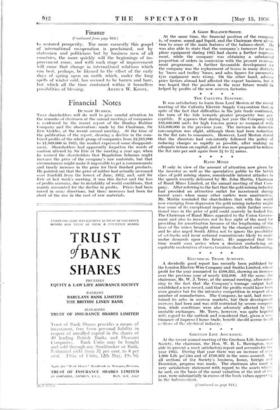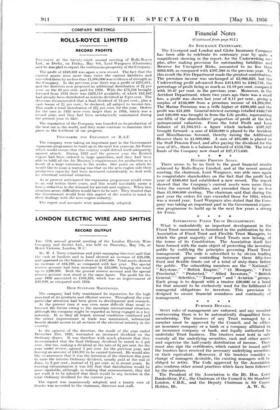Financial Notes
DUNLOP RUBBER.
THAT shareholders will do well to give careful attention to the remarks of chairmen at the annual meetings of companies is evidenced by the recent report of the Dunlop Rubber Company and the observations made by the Chairman, Sir Eric Geddes, at the recent annual meeting. At the time of the publication of the report, showing a decline in the com- bined profits of the whole group of companies from 12,285,000 to £1,869,000 in 1935, the market expressed some disappoint- ment. Shareholders had apparently forgotten the words of caution uttered by Sir Eric at the meeting a year ago, when lie warned the shareholders that Regulation Schemes might increase the price of the company's raw materials, but that circumstances might make it impossible to get a commensurate and timely increase in the price for Their finished products. He pointed out that the price of rubber had actually increased over fourfold from the lowest of June, 1932, and, said Sir Erie at last week's meeting, it was this factor and the loss of profits overseas, due to instability of world conditions, that mainly accounted for the decline in profits. Prices had been raised in some directions, but these increases had been far short of the rise in the cost of raw materials. A GOOD BALArrekz&rr.or.
At the same time, the financial position of the company is, of course, somal,ttpd liquid, andsthe Chairman drew, atten- tion'to some of the main features of the balance-sheet. Ile was also able to state that the company's turnover for aero- plane equipment during 1935 had shown a further improve- ment, while the company was obtaining a substantial proportion of orders in connexion with the present re-arma- ment programme. A further favourable development for the company was the replacement of trams in many districts by 'buses and trolley 'buses, and sales figures for pneurnat:e tyre equipment were rising. On the other hand, adverse price factors abroad had affected the export business, but it was hoped that the position in the near future would be helped by profits of the new oversee factories.
* * * THE CALCUTTA ELECTRIC.
It was satisfactory to learn from Lord Meston at the recent meeting of the Calcutta Electric Supply Corporation that, in spite of the fact that difficulties in the jute trade continued, the turn of the tide towards greater prosperity was per- ceptible. It appears that during last year the Company sold 183,000,000 units for high tension power as compared with 155,000,000 in the previous year. The increase in domestic consumption was slight, although there had been reduction in the flat rate to consumers. However, Lord Meston stated that the directors had consistently followed the policy of reducing charges as rapidly as possible, after making an adequate return on capital, and it was now proposed to reduce the flat rate per unit again from 21 to 2} annas.
* * * * RAND MINES
If only in view of the amount of attention now given by the investor as well as the speculative public to the better class of gold mining shares, considerable interest attaches to the speech recently delivered by Mr. John Martin, Chairman of Rand Mines Limited, at the annual meeting of that Com- pany. After referring to the fact that the gold mining industry had provided an attractive outlet for investment during recent years when many other outlets were unattractive, Mr. Martin reminded the shareholders that with the world now emerging from depression the gold mining industry might lose some of its exceptional importance, while further sensa- tional rises in the price of gold could scarcely be looked for. The Chairman of Rand Mines appealed to the Union Govern- ment and also to investors not to lose sight of the need for providing for amortisation because of the lengthening of the lives of the mines brought about by the changed conditions, and he also urged South Africa not to ignore the possibility of set-backs and incur national commitments likely to make undue demands upon the future. He suggested that the time would soon arrive when a decision embodying an equitable moderation of excess taxation should be forthcoming.
ELECTRICAL TRADE ACTIVITY.
A decidedly good report has recently been published by the London Electric Wire Company and Smiths Limited, whose profit for the year amounted to £108,335, showing an increase over the previous year of nearly £32,000. All the same, the chairman, Mr. W. J. Terry, at the annual meeting, after refer- ring to the fact that the Company's tonnage output had established a new record, said that the profits would have been even greater but for the intensive competition in respect of a number of manufactures. The Company, he said, had main- tained its sales in oversee markets, but their development overseas had been and was still restricted by severe competi- tion, while conditions were also adversely affected by the unstable exchanges. Mr. Terry, however, was quite hopeful with regard to the outlook and considered that, given a con- tinuance of improved home trade, benefit should accrue to all sections of the electrical industry.
* * * *
GRESIIAM LIFE ASSURANCE.
At the recent annual meeting of the Gresham Life Assurance Society, the chairman, the Hon. W. B. L. Barrington. was able to present a most satisfactoryreport and accounts for the year 1935. During that year there was an increase of over 1,000 Life po!ieies and of 1768,602 in the sums assured. In all sections of the Society's business, home, foreign and Dominion, progress was made. The chairman also made a very satisfactory statement with regard to the assets which. he said, on the basis of the usual valuation at the end of the year, were substantially in excess of the book values appearing in the balance-sheet. (Continued on page 914.)
Financial Notes
(Continued from page 912.) AN INST.-RANCE CENTENARY.
The Liverpool and London and Globe Insurance Company has been able to celebrate its centenary year by quite a magnificent showing in the report, for the Underwriting sur- plus, after making provision for outstanding liabilities and Reserve for Unexpired Risks, amounted to no less than £663,839, as compared with £507,388 in the previous year. To this result the Fire Department made the greatest contribution. The premium income was unchanged at 23,960,629, but the Underwriting profit advanced from £414,695 to £482,741, the percentage of profit being as much as 12.19 per cent. compared with 10.47 per cent, in the previous- year. Moreover, in the Accident Department, where two years ago there was a small loss, a profit was shown last year of 3.11 per cent., giving a surplus of £133,809 from a premium income of £4,293,399. The Marine Premium was a trifle higher at £290,398 and the profit was £21,289. General interest earnings totalled £442,749 and £26,000 was brought in from the Life profits, representing one-fifth of the shareholders' proportion of profit at the last quinquennial valuation. From the total Profit and Loss balance of £1,703,915—a figure which includes £597,327 brought forward—a sum of 1350,000 is placed to the Accident and Miscellaneous Account, thereby raising the Additional Reserve there to £1,000,000. A sum of £85,000 is placed to the Staff Pension Fund, and after paying the dividend for the year of 27s., there is a balance forward of £553,796. The total funds of the Company now stand at £27,175,649.
* * * * RECORD PROFITS AGAIN.
There seems to be no limit to the good financial results achieved by Rolls-Royce Limited, and at the recent annual meeting, the chairman, Lord Wargrave, was able once again to congratulate shareholders on the fact that the profit last year of £349,802 had established a new record. The report showed that the Company's current assets were more than twice -the current liabilities, and exceeded these by no less than £1,000,000 sterling. The chairinan said that during the past year the orders for cars exceeded those for 1934, which was a record year. Lord Wargrave aLso stated that the Com- pany was taking an important part in the Government expan- sion programme to build up in the next few years a strong Air Force.
* * * * INTERESTING FIXED TRUST DEVELOPMENT. What is undoubtedly an important development in the Fixed Trust movement is furnished in the publication by the Association of Fixed Trust and Flexible Trust Managers, to which the great majority of Fixed Trusts now 'belong, of -the terms of its Constitution. The Association itself has been formed with the main object of protecting the investing public by codifying the principles governing Fixed Trust management. The code is subscribed to by eleven leading management groups controlling between them fifty-two fixed and flexible trusts out of a total of sixty-three before the public. The subscribing members are the "National," " Keystone," " British Empire," " 15 Moorgate," " First Provincial," " Protected," " Allied Investors," " British General," " Selective," " Transport " and " Aviation " groups. Each group is to deposit with a trustee £20,000 or a bond for that amount to be exclusively used for the fulfilment of managerial obligations to investors. This provision is designed to ensure financial soundness and continuity of management.
* * * * FrwrnER Drrans.
Strict rules of management are enforced, and any member contravening them is to be automatically disqualified from membership. The trustees of any Trust managed by a member must be approved by the Council, and be either an insurance company or a bank or a company affiliated to an insurance company or bank, and legally authorised to undertake Trust business. The trustees must hold in safe custody all the underlying securities, cash and other assets and supervise the half-yearly distribution of income. They must also sign the certificates, which cannot be issued until the trustees have received the necessary underlying securities or their equivalent. Moreover, if the trustees consider a change of managers desirable, the existing managers will be obliged to retire. The Code approved by the Association also confirms other sound practices which have been followed by the members.
The President of the Association is the Rt. Hon. Lord Rankeillour, P.C., the Chairman of the Council is Sir Stanford London, C.B.E., and the Deputy Chairman is Sir Lassie























































 Previous page
Previous page